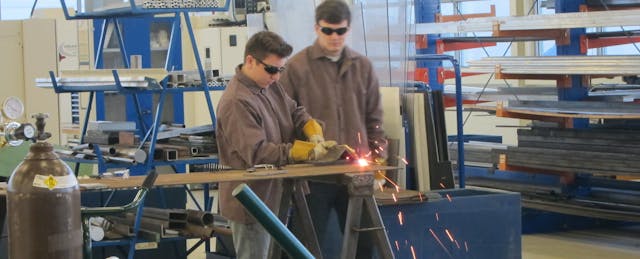Four-year college isn’t the path for everyone. Though high school graduation rates are on the rise, students don’t always see a bachelor’s degree as the right next step. This can be for a variety of reasons: grades, financial situations, different interests. And that’s OK. What’s not OK is when students quit high school first.
So how do we engage students even after they’ve decided college isn’t for them?
At Hamilton County Schools, the answer is our Career and Technical Education (CTE) program, which we call the Mechatronics Akademie at Volkswagen. The program combines hands-on training with online and classroom instruction to give students who may not be planning to attend a four-year college the opportunity to feel enthusiastic and connected to their work.
The result is not only higher graduation rates, but better academic outcomes across the board. We have seen students become much more engaged as they discover the connection between the academic work and the workplace. As one student succinctly put it: “When I am in the classroom, I can now see why I need to know this.”
The case for technical schools
Career and technical programs are about a lot more than letting students explore career options. In 2016, Fordham University found that students with more exposure to CTE courses are more likely to graduate, enroll in a two-year college, be employed, and have higher wages. Studies also found students who “concentrate” their CTE studies (taking a sequence of three or more courses aligned to a career in a specific industry) are more 21 percent more likely to graduate high school than otherwise identical students.
There are also benefits post-graduation. Many trades expect some level of educational training upon entering the workforce. For example, electronic engineering technicians, dental hygienists and paralegals are all expected to earn an associate's degree before breaking into their fields.
CTE programs can give students a head start in their careers by providing the opportunity to master highly attractive trade skills. Some, like Hamilton County’s Mechatronics Akademie, even offer credit towards an associate’s degree. This program allows the students to complete all but two short semesters of post secondary work after high school graduation prior to receiving their Associate of Applied Science in Mechatronics degree.
Last year, to tap into these benefits, Hamilton County partnered with Volkswagen and Chattanooga State Community College, and the Mechatronics Akademie was born.
So what’s our program look like?
Mechatronics, for those unfamiliar with the field, is a combination of mechanical, computing, electronics and control systems. At our Mechatronics Akademie, juniors and seniors have the opportunity to spend half of the day in technical training at VW Chattanooga and the other half on traditional required courses taught through online learning provider Edgenuity.
Each day, students come to “school” wearing a VW uniform and arrive on time, as would be expected in the real world. Students readily report that “Volkswagen doesn’t do late.“ Although they are not actually working, many explain that attending the Akademie feels more like a job than school.
In addition to their required high school classes, which they complete online, students also take college level Mechatronics courses such as Welding Principles, Mathematics for Engineering Technology, Industrial Safety, Electrical Fundamentals, Concepts of Physics and Fluid Power. Technical classes are made up of 30 percent of classroom instruction, with the rest of the time dedicated to hands-on learning to promote the transfer of theory to application.
As a result of their hard work, students graduate from high school with more than 40 credit-hours to go towards a degree, with the option to complete their Associate of Applied Sciences degree within one year of high school graduation.
CTE in practice and progress
Online learning is an important part of the reason why the Mechatronics Akademie has been so successful. The Edgenuity curriculum provides a way for students to commit to the program at VW without having to go back and forth from school to the plant. Students love the flexibility that comes from online learning, particularly when they have the support of teachers in the Akademie. One student recently shared that he was particularly appreciative of the Sunday night texts he received, a simple, “Remember your final draft is due in the morning.”
So how is the Mechatronics Akademie impacting our students? In terms of academic success, we are seeing a lift in overall performance as students feel connected to their studies and excited to come to school. We have one student, Anna, who wasn’t strong in the traditional school setting. After joining the Mechatronics Akademie, her GPA went from 1.6 to a 3.2 and she made honor roll for the first time in her life. The truly exciting part of Anna’s accomplishment is that she is experiencing this success in a more rigorous curriculum, while earning nine hours of college credit at the same time.
Ultimately, it isn’t possible for all students to succeed in the traditional high school setting. The trick is to get creative about opportunities and partnerships within and outside of the school that will leverage their strengths and help them see the value in learning. With the combination of hands-on, in-class and Edgenuity online learning, our CTE program is able to help all students see their potential and future more clearly.


